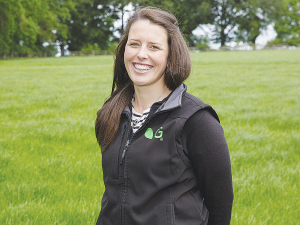Green no more?
OPINION: Your old mate has long dismissed the Greens as wooden bicycle enthusiasts with their heads in the clouds, but it looks like the ‘new Greens’ may actually be hard-nosed pragmatists when it comes to following voters.
 Sarah Gard believes pasture that improves the performance of livestock while reducing their carbon footprint offers NZ farmers a win-win.
Sarah Gard believes pasture that improves the performance of livestock while reducing their carbon footprint offers NZ farmers a win-win.
OPINION: It can only get harder to farm during the next 10 to 20 years — but pasture-based mitigation techniques can help.
Climate change will directly impact all New Zealand farmers – rising temperatures, more frequent weather extremes and/or increasing regulation.
A recent survey for the Ministry for Primary Industries shows 92% of farmers are addressing environmental sustainability, up from 79% in 2009. But only 23% are intent on reducing greenhouse gases, down from 30%.
Nearly half of NZ’s greenhouse emissions are from agriculture. So part of every farmer’s social licence and responsibility as caretakers of the land is to do their bit to address environmental issues.
Many farmers quickly turn to livestock solutions that immediately affect farm emissions, such as reducing stocking rates. But innovative pasture and plant breeding technology also has an important role to play. When used alongside livestock techniques, pasture management can help farmers take a far-reaching approach to climate change mitigation.
NZ Geographic recently quoted a Hawke’s Bay farmer saying: “People think we farm animals but we don’t, we farm soil.”
I agree. Knowing what pastures to plant and where, buying new seed varieties and improving soil fertility can help develop a sustainable farming system for the long term.
Many pasture-based mitigation techniques can be adopted now. For example, the use of alternative forages proven to reduce nitrogen and methane is a cost-effective way to improve production.
High sugar grasses are particularly important in this. Grass that improves the performance of livestock while reducing their carbon footprint offers NZ farmers a win-win. And it requires no notable change of system.
Also, farmers can make daily simple management decisions that reduce on farm emissions, e.g. managing dry matter intake and feed type, paddock selection and grazing time, and using catch crops after winter crops.
New agricultural technologies are rapidly being developed, e.g. smart crop forecasting by artificial intelligence, rural robotics, methane inhibitors and electromagnetic soil mapping.
Science is the key to ensuring NZ’s primary sector stays viable in a low-carbon world. As technology develops, more strategies and techniques will be available to farmers. But the science must be practical and applicable. There is no use in researching things that farmers can’t easily take up and get behind.
And while a ‘quick fix’ may be tempting, the bigger picture demands more forward thinking and proactivity. Although a focus on the land might not give an instant result, do it alongside your livestock and see a longer term sustainable solution.
Farmers today need a ‘social licence’ to farm, despite not always enjoying a direct cost benefit from it. But they have little choice if they want to be farming in 20 or 100 years.
• Sarah Gard is general manager for seed company Germinal New Zealand. She also manages a North Canterbury dairy farm with her husband.
According to the latest Fresh Produce Trend Report from United Fresh, 2026 will be a year where fruit and vegetables are shaped by cost pressures, rapid digital adoption, and a renewed focus on wellbeing at home.
The Roar is a highlight of the game hunting calendar in New Zealand, with thousands of hunters set to head for the hills to hunt male stags during March and April.
OPINION: The past few weeks have been tough on farms across the North Island: floods and storms have caused damage and disruption to families and businesses.
European dairy giant Arla Foods celebrated its 25th anniversary as a cross-border, farmer-owned co-operative with a solid half-year result.
The sale of Fonterra’s global consumer and related businesses is expected to be completed within two months.
Fonterra is boosting its butter production capacity to meet growing demand.